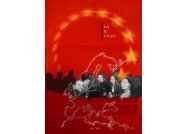turkish-greek civic dialogue - AEGEE Europe
turkish-greek civic dialogue - AEGEE Europe
turkish-greek civic dialogue - AEGEE Europe
Create successful ePaper yourself
Turn your PDF publications into a flip-book with our unique Google optimized e-Paper software.
From the novels of this second period, Dido Sotiriou’s Bloodied Earth (1962),<br />
which had also important impact in Turkey, and Kosmas Politis’ In the<br />
Chatzifrangou Quarter (1963) are distinguished. For Sotiriou, the main guilty<br />
of the disaster was the foreigners: the Germans, that roused the Turks against<br />
“giaur” during the First World War, and then the English and the French, that<br />
pushed Venizelos in a risky expedition - it is implied that they all served their<br />
own interests. This interpretation is absolutely aligned with the traditional<br />
opinion of the Greek Left Wing for the role of foreign dependence in the entire<br />
Modern Greek history. Nevertheless, it does not leave many choices for selfcriticism.<br />
A bolder, almost heretic author is Kosmas Politis. For him, the Greeks are<br />
equally responsible as the foreigners that sent them in Minor Asia. However,<br />
this opinion constitutes a rather individual case in the Greek Literature. The<br />
opinion that Dido Sotiriou expresses is much more characteristic for the new<br />
literary “wave”. A paradoxical phenomenon is the relative rarity and ellipticity<br />
of reports in Greek literature, until recently, in the drama of refugees<br />
from Minor Asia and Eastern Thrace after their installation in Greece. Their<br />
reception from the natives was not always so friendly and patriotic, since<br />
there was remarkable discrimination against them. In the Greek literature,<br />
however, for a lot of decades, all these were probably suppressed. A bigger<br />
exception is Venezis’ novel Tranquillity (1939). Someone may suppose that this<br />
subject did not suit in the ideas of national unanimity or, alternatively, of the<br />
class solidarity, which constituted the two sovereign reasons of that time and<br />
inspired most men of letters.<br />
They dealt with foreigners (or infidels) that were eradicated by Greece and<br />
became refugees even less. However, there is an impressive, early exception:<br />
Pantelis Prevelakis’ book The Chronicle of a Town, since 1938. Prevelakis<br />
dedicate his more shocking pages in the exit of Turkish Cretans after the<br />
agreement of the exchange of populations.<br />
In 1994, the veteran politician Mihalis Papakonstantinou, who was Minister of<br />
Foreign Affairs in various governments, published the book My Aunt Roussa. His<br />
aunt Roussa is a patriot and hates Kemal, but she believes that the “bad Turks”<br />
were the ones left from those parts after the Balkan wars, but those who<br />
remained were good. We have already passed in a new phase, where other types<br />
of sensitivities dominate in the work of Greek writers about the catastrophe of<br />
1922 and, generally, the Greek-Turkish relations. In Rea Galanaki’s novel, The<br />
Life of Ismail Ferik Pasha (1989), she speaks about the drama of a person with<br />
Association des Etats Généraux des Etudiants de L’<strong>Europe</strong><br />
mixed identity, which history tends to split. Theodoros Grigoriadis, in his novel<br />
The Waters of the Peninsula (1998), describes a walking English sightseer, his<br />
Greek interpreter and a Muslim seminarist in Thrace (Western and Eastern)<br />
of 1906. He focuses in the deep, at some way, erotic friendship between the<br />
Greek and the Turk. Furthermore, Thanasis Valtinos, from his point of view,<br />
in The Story Book of Andreas Kordopatis, (book second, 2000), reverses two<br />
Greek taboos about the tragedy of Minor Asia. Theodoros Grigoriadis expresses<br />
very beautifully, what these all mean, with an answer that his Greek hero gives<br />
to the English sightseer: “It’s not necessary to be attached in our self picture,<br />
in our self identity”.<br />
BOOKS & WORKS DISCUSSED<br />
Stratis Doukas (1895 – 1983), A Prisoner’s Story (1929)<br />
Ilias Venezis (1904 – 1973), Number 31328 (1931)<br />
Pantelis Prevelakis (1909 – 1986), The Chronicle of a Town (1938)<br />
Ilias Venezis, Tranquillity (1939)<br />
Dido Sotiriou (1909 - ), Bloodied Earth (1962)<br />
Kosmas Politis (1888 – 1974), In The Chatzifrangou Quarter (1963)<br />
Yorgos Ioannou (1927 – 1985), “By the House of Kemal”<br />
(The Only Heritage, 1974)<br />
Rea Galanaki (1947 - ), The Life of Ismail Ferik Pasha (1989)<br />
Mihalis Papakonstantinou (1919 - ), My Aunt Roussa (1994)<br />
Anastassia Karakassidou, Fields of Wheat, Hills of Blood (1997)<br />
Theodoros Grigoriadis (1956 - ), The Waters of the Peninsula (1998)<br />
Thanassis Valtinos (1932 - ), The Story Book of Andreas Kordopatis,<br />
Book II (2000)<br />
Population Exchange<br />
145







